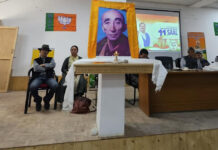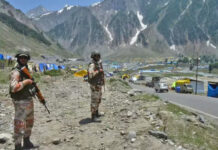Acclaimed author, Geetika Kohli Amla has come up with her sixth poetry collection, Rooms That Occupy Us, published by the prestigious Authors Press of New Delhi. The book, with over fifty masterfully crafted poems of various genres, is a journey through grief where Geetika rises from her denials to face death in its callous beauty. In these heartfelt pieces, she unravels cold metaphors: her breath, a mere ‘bunting she hangs between two distant numbers on a clock’, and swallows piercing ironies: What has vision won for me – a crisis of blurring shapes? Rooms, she says, happened when she had been ‘hallucinating’ after she had lost her spiritual companion, her father. Much before she could come to terms with the enormity of her loss, she sensed she had collided with a freedom that perhaps she did not know she wanted. Besides her sublime verses, the book also houses some intuitive sketches done by the poetess. Geetika gained worldwide acclaim when at the tender age of 21, her poems had found place in an international anthology titled ‘Blossoms of India’. She went on to write several other books including The Lost Sonnet and Other Poems, Yonder, Nothingness at Boiling Point, Lucid Blood and Crooked Hyphens, that was released by Dr. Karan Singh at Amar Mahal and Dr. Kapila Vatsyayan at India International Centre in 2018. She is a life member of the Poetry Society of India and her work has been reviewed by K Satchidanandan, noted poet and former secretary of Sahitya Akademi. Geetika strongly believes that poetry heals and helps address one’s insecurities, and also unmasks social failures at large, assisting individuals in countering the alienation they feel, and uniting their voices into one empowered cry for change. Through her writings, she attempts to explore our Kafkaesque reality, to portray the ironies behind our existentialist interpretations of everything religion, and many times, to capture via the massive scope of the soul, possibilities for love. She sees in poetry, a paradoxical intervention, and as a voice for peace, has been employing it as a tool for social change. Her dream is to bring quality poetry to her people and to place her hometown on the global map through a series of efforts, of which, writing is but one.

Dogra Herald is the media of J & K, breaking language and geographical barriers, connecting J & K to the rest of India.
0191 245 4946
info@dograherald.com
Latest articles
Costly human error
iamjkstarr - 0
Nizamuddin shrine turns Delhi into a COVID-19 cluster. The Govt must ban congregations altogether, monitor markets
Just when we were reading about Patient 31 in...
India must aspire to be top recipient of FDI: Ravi Shankar Prasad
iamjkstarr - 0
India must aspire to be the largest FDI recipient globally and "has everything going for it", given its vibrant digital profile, huge market and...
Be prepared to meet challenges of modern warfare: Lt Gen Kumar asks IMA Cadets
DOGRA HERALD BUREAUDEHRADUN, June 8General Officer Commanding-in-Chief Northern Command, Lt Gen MV Suchindra Kumar, on Saturday said the nature and dynamics of...


























